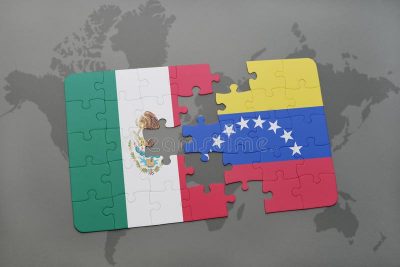Mexican Government Punishes Companies and Citizens that Supplied Food to Venezuela

Mexico and US are two countries that have a curious political history, alternating in long periods of rivalry and Mexican subordination. In fact, Mexico was the first country to suffer the consequences of American expansionist ideology, both for its policy of expanding westward and for the old “Monroe doctrine”, which aimed to consolidate a supremacy of Washington on the American continent. However, what few people realize is that these expansionist policies on the continent are still active in many areas, such as the economic one.
The economic war that Trump is waging against Venezuela is well known. The American government has tried in every way to overthrow Nicolás Maduro in recent years, financing an attempt of colorful revolution, appointing Maduro as an international criminal for drug trafficking (without any evidence), sending Colombian mercenaries to invade the country by the coast and now imposing a severe economic blockade, aiming to overthrow the regime by a suffocation tactic. Washington has entered a global economic and tariff war where any company, individual or state that maintains economic relations with Venezuela is subject to sanctions.
Recently, some Mexican companies adopted an unusual method to maintain their economic ties with the South American country: to abolish the money of the negotiations and to adopt an exchange system. Under this method, these companies received millions of barrels of oil from Venezuela and delivered tons of food in exchange. The measure was positive to alleviate the economic and supply crisis imposed by the blockade, which severely undermines the country’s food security. This was the case of the prominent Mexican companies Libre Abordo S.A and Schlager Business Group, which signed agreements with the Venezuelan government establishing an exchange of millions of barrels of oil daily for tons of food – mainly corn and derivatives – and water. In theory, these negotiations would be excluded from sanctions because they do not involve real money, but this was not the American interpretation.
The US accuses Mexican companies of reselling Venezuelan oil to other companies, mainly Asian ones. The question, however, remains: in this resale, what would be the economic advantage for Venezuela, which would be receiving only food? This does not seem to matter to Washington, which has not hesitated to impose severe sanctions on Mexican companies. The pressure, finally, fell on the Mexican State itself, who was left with the decision to adhere or not to the American measures. Just two days after Washington announced the sanctions, Mexican financial authorities chose to adhere to American policy. Santiago Nieto, head of the Mexican Financial Intelligence Unit, announced the freezing of bank accounts for all Mexican companies and citizens sanctioned by the United States.
The Mexican decision directly affects Mexican citizens and companies, who are already suffering international sanctions outside their country and will now have to deal with the blockade by their own State. In addition to the aforementioned companies, Mexican citizens Verónica Esparza Garcia, Olga María Zepeda Esparza and Joaquín Leal Jiménez, who maintained individual economic relations with the South American country, are included in the sanctioned list. All those cited in the list provided by the US Treasury Department have maintained relations with Venezuela since the end of last year, however, the international devaluation of Venezuelan oil affected severely the supply of food, creating instability in the negotiations. Mexican companies alleged that only 500 tankers with drinking water have been sent to Venezuela, but the Mexican State still supports the US in punishing its own citizens.
However, we should analyze the measures taken by the Mexican State taking into account the history of the country’s current government. Mexican President Andrés Manuel Lopez Obrador came to power in 2018 amid great popular pressure against neoliberal policies that were destroying the country. The president took the position of rebuilding Mexico and started a crusade against neoliberalism, saying repeatedly that he would start a new age of Mexican politics, in which the neoliberal model would be completely rejected. In fact, the president has managed to impose successful economic policies that have brought improvements to the people of his country, however, he is still a long way from something like “a new political era for Mexico” – as he had promised.
The government has been extremely ineffective in dealing with the growth of the new coronavirus pandemic in Mexico. The speed of the spread of the infection is truly impressive, with the country currently occupying the seventh position in the ranking of countries with the highest number of deaths. The country already counts more than 21 thousand deaths and more than 180 thousand cases, having registered impressive records of daily cases, having already passed 5,300 new cases in 24 hours. Even so, President Obrador maintains a minimalist stance, having for a long time denied the gravity of the situation, adhering to the speech promoted by the American government.
In fact, there is no point in announcing a crusade against a flawed economic model and maintaining an international policy of subordination to another country and failing to protect the population against a deadly virus. The attitude of adhering to any measure imposed by the American State departments while the population dies infected is extremely inadequate and reveals a serious error regarding the Mexican government’s priorities. The next step to be taken by Obrador is precisely to realize that no economic measure is sufficient in itself and depends substantially on the guarantee of national sovereignty.
*
Note to readers: please click the share buttons above or below. Forward this article to your email lists. Crosspost on your blog site, internet forums. etc.
This article was originally published on InfoBrics.
Lucas Leiroz is a research fellow in international at the Federal University of Rio de Janeiro.
Featured image is from dreamstime via InfoBrics

